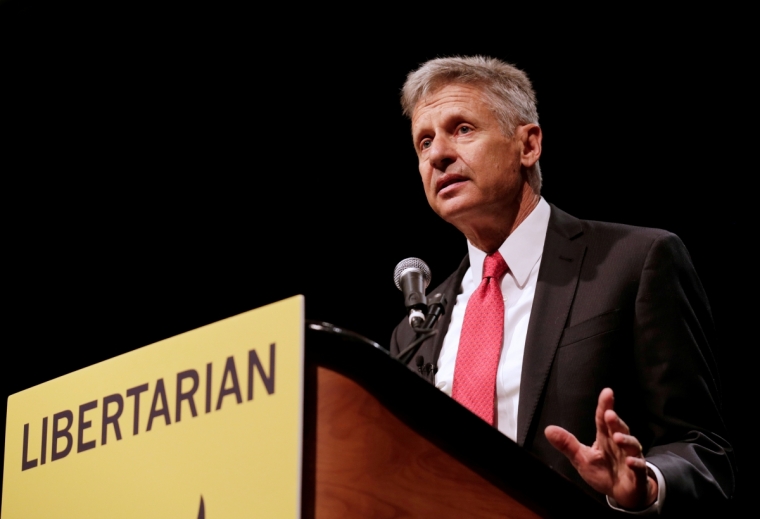Libertarian candidate says religous freedom 'a black hole'

PHILADELPHIA (Christian Examiner) – A third-party candidate gaining traction among both Republicans and Democrats said in an interview at the Democratic National Convention that religious liberty is "a black hole" that can be used to promote discrimination.
Libertarian Gary Johnson said in an interview with the Washington Examiner that the First Amendment has been too narrowly defined and private business owners should not be allowed the right to refuse to provide services for events such as same-sex weddings.
In particular, Johnson – the former governor of New Mexico – was asked by reporter Timothy Carney if the New Mexico wedding photographer fined by the state for not photographing a gay wedding should have been allowed to refuse the request. He did not directly address the case, but answered:
You've narrowly defined this. But if we allow for discrimination – if we pass a law that allows for discrimination on the basis of religion – literally, we're gonna open up a can of worms when it comes to stopping discrimination of all forms, starting with Muslims ... who knows?
"Here's the issue. You've narrowly defined this. But if we allow for discrimination – if we pass a law that allows for discrimination on the basis of religion – literally, we're gonna open up a can of worms when it comes to stopping discrimination of all forms, starting with Muslims ... who knows? You're narrowly looking at a situation where if you broaden that, I just tell you – on the basis of religious freedom, being able to discriminate – something that is currently not allowed — discrimination will exist in places we never dreamed of."
He also said he didn't believe the Religious Freedom Restoration Act, passed by Congress during the Clinton administration, could be used to "cut out a little chunk" for groups like the Little Sisters of the Poor, an order of Catholic nuns that has been in a multi-year fight over the Obama administration's mandate that health care plans cover abortion-inducing birth control medications.
Allowing the nuns to follow their consciences, he said, will "open up a plethora of discrimination that you never believed could exist. And it'll start with Muslims."
Johnson said he is aware that his message will likely turn off conservative Republicans who have been eyeing his candidacy and he admits that his take on religious liberty is at odds with the Libertarian Party as a whole.
But, he said, "My crystal ball is that you are going to get discriminated against by somebody because it's against their religion. Somehow, you have offended their religion because you've walked in and you're denied service. You."
Johnson said he believes the role of the federal government is to prevent all cases of discrimination and to prevent claims that seem "to go outside the bounds of common sense."
He then offered his own example, straining the bounds of common sense, of someone shooting another person and saying it was permissible because "their freedom of religion says God has spoken to them and that they can shoot somebody dead."
"I just see religious freedom, as a category, of just being a black hole," Johnson said.
That isn't an answer that is likely to gain Johnson many followers among conservative evangelicals who believe groups like Little Sisters of the Poor and private businesses like Hobby Lobby and the Masterpiece Cake Shop can obey the dictates of their conscience instead of the heavy hand of government.
Hobby Lobby sued the federal government after the Affordable Care Act mandated the company provide abortifacients in its health plans. The company won the case.
Jack Phillips, owner of Masterpiece Cake Shop in Colorado, has appealed to the U.S. Supreme Court after the Colorado Supreme Court refused to hear his case. He was found guilty of discrimination by the state's Civil Rights Commission for refusing to decorate a cake celebrating a same-sex marriage.
In the same interview, Johnson said he did not favor changing America's abortion laws and said he was socially liberal on the issue of abortion. He said the law allows abortion up to the point of the fetus's viability outside of the womb (even on artificial life support). That makes is view opposite that of most evangelical Christians.
"I'm not a social conservative," Johnson said.